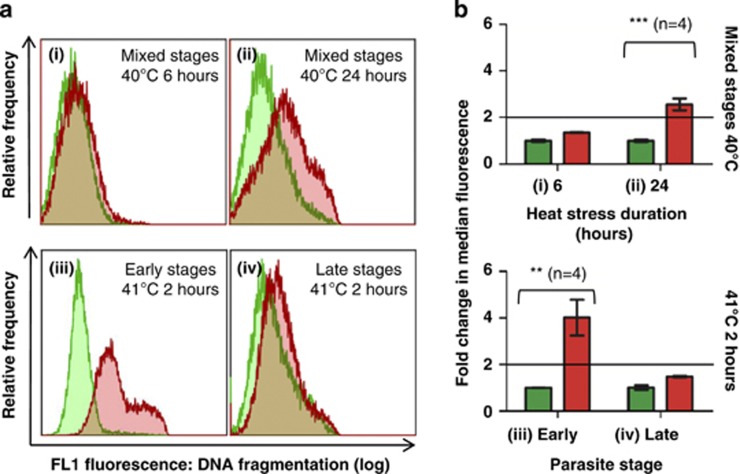Figure 3.
Heat stress induced DNA fragmentation in P. falciparum, as measured by the TUNEL assay. Control parasites, incubated at 37 °C, are indicated in green, whereas heat-stressed parasites are indicated in red. All samples were collected at 24 h. TUNEL results indicated significant DNA fragmentation in mixed-stage parasites exposed to 40 °C for 24 h and synchronised ring-stage parasites exposed to 41 °C for 2 h, with only slight fragmentation in synchronised late-stage parasites exposed to the same stress, compared with control parasites at identical time intervals. (a) Overlaid fluorescence histograms of the TUNEL assay indicate the FL1 (dUTP-FITC) fluorescence of isolated parasites from individual heat-stressed (red) or control (green) data sets. Fragmentation resulted in a higher fluorescence, indicated by a shift towards the right. Heat stress conditions are indicated in the top right corner of each overlay. Figure numbers (i–iv) match those of the bar graphs. (b) Bar graphs summarise TUNEL results for mixed-stage parasites exposed to 40 °C for 6 (i) and 24 (ii) hours, as well as synchronised early (iii) and late (iv) stage parasites exposed to 41 °C for 2 h. Changes in fragmentation are indicated as the mean change in median fluorescence for all samples. Differences of twofold or greater (indicated by a horizontal line on bar graphs) between heat-stressed and corresponding 37 °C control parasites are considered indicative of fragmentation. Data points indicate the arithmetic mean of replicates±S.E.M. Comparisons between control and heat-stressed parasites showed P-values that are significant at <0.01 (**) or <0.001 (***)

